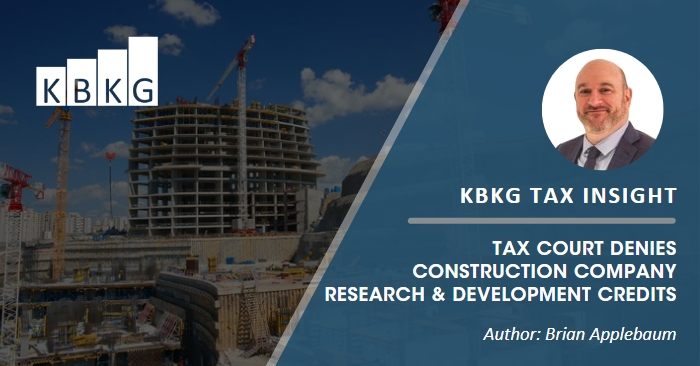A summary judgment was recently granted when the government successfully argued that a construction company did not conduct qualified research activities during the tax year in question and was therefore not entitled to the $576,756 refund they were paid. In this case, the defendant was a shareholder of a civil construction company and the contested refund amount was his pro rata allocation of the company’s research and development (R&D) tax credit claim.
KBKG Tax Insight:
This case reemphasizes the importance of R&D studies properly documenting the qualified nature of their business components and expenses in construction – an industry where R&D tax breaks are touted but often little understood (only certain phases of construction are likely to have activities that qualify for the credit, for instance). R&D Credits in the construction industry can often be rejected for a variety of reasons from the funded research rules to the qualified nature of the activities. These claims ultimately also failed due to more than just one issue, further highlighting need of a support team that can make sure that complex and multiple qualification requirements are met.
Background: What is the R&D Tax Credit & What Activities Qualify?
The R&D Tax Credit is a federal tax incentive designed to promote innovation. It allows companies across a wide variety of industries to receive tax credits for expenses incurred during the R&D process. To determine whether activities qualify for the credit, the applicable tax code (26 U.S.C. §41) lays out four requirements:
- The expenses must be of the type deductible under [26 U.S.C.] § 174.
- The research must be undertaken for the purpose of discovering information that is technological in nature.
- The application of that information must be intended to be useful in the development of a new or improved business component of the taxpayer.
- Substantially, all of the activities must constitute elements of a process of experimentation.
Why Didn’t the Research Qualify for Credits Upon Examination?
In this case, United States of America v. Leonard L. Grigsby, et al., the court focused on the third requirement above. The term “business component” means any product, process, computer software, technique, formula, or invention which is to be (i) held for sale, lease, or license, or (ii) used by the taxpayer in a trade of business of the taxpayer. 26 U.S.C. § 41(d)(2)(B).
In the defendant’s initial interrogatory responses, they claimed that for each of the representative projects the company developed a product. The defendant changed course in successive filings to claim that the company developed construction processes which were then used to construct items for its clients.
Through some lengthy discussion of procedural intricacies, the court claimed that the defendants were obligated to supplement their interrogatory responses to shift from proving the business component element through evidence of a process as opposed to that of a product, ultimately determining that the defendants could not rely on any evidence that the company developed processes capable of satisfying the business component requirement.
The court went even further in stating that even if this shift in tactic was allowed, the defendant’s argument would fail due to lack of specificity because they did not identify even one new or improved process that resulted from the work on the four projects.
Funded Research Is an Exclusion to the Credit
The court determined that the credit claims also failed because the alleged research was “funded” within the meaning of the Tax Code and thus excluded from eligibility for the credit. “Funded research” is one of eight express exclusions to the credit and refers to research funded by a grant, contract, or another person. (26 U.S.C. § 41(d)(4)(H)).
The determination of funding in this context focuses on the underlying contracts between the taxpayer performing the research and the other parties. There are two main factors to consider if it is not obvious from the contracts whether the research was funded:
- Amounts payable under any agreement that is contingent on the success of the research and thus considered to be paid for the product or result of the research (see §1.41-2(e)(2)) are not treated as funding. In such circumstances, the party performing the research is entitled to the credit because it bears the risk of failure.
- A taxpayer is entitled to the credit only if it retains substantial rights in the research. This determination comes down to whether the taxpayer has the right to use or exploit the results of the research. If it does not, then the expenditures are not applicable towards the credit.
The court ultimately found that the contracts underlying the four projects showed that the taxpayer either did not maintain substantial rights to the research or was paid for the research. This conclusion meant that even if it was determined that the taxpayer did engage in qualified research, it would be considered funded and therefore excluded from credit eligibility.
KBKG Insight:
A proper examination of the components, activities, and contractual terms generally go a long way in determining eligibility for the R&D tax credit. Even as the IRS recently granted applicants more time to provide more details (in contemporaneous documentation covering at least five areas) to make sure they justify claims for the R&D Tax Credit, the burden of proof ultimately remains with the taxpayer and their consulting team.
Conclusion
The R&D credit was created to promote innovation. While the credit is not meant to be limited to specific industries, R&D credit studies should not be conducted using the “canned” approach. Each industry has very specific challenges. With respect to construction, special attention should be paid to identifying the business components (is it a product, process, software, formula or technique?). Additionally, making sure the research is not funded by conducting a contract review and properly documenting the qualified nature of the business components and the activities would go a long way in supporting the qualification of the claim.
Action Steps
Questions about R&D Tax Credit or looking for an eligibility assessment? Contact us today. We’re here to help.
Download – KBKG Tax Insight: Tax Court Denies Construction Company R&D Credits
Related Articles
- An Introduction to the Reverse Plea to the U.S. Senate and House of Representatives to Extend Section 174
- Inflation Reduction Act Expands Payroll Tax Credit Benefits for Small Businesses
- KBKG Tax Insight: Changes to Recently Amended Texas Tax Regulations
About the Author
Brian Applebaum – Senior Manager
 Southwest
Southwest
Brian Applebaum is a Senior Manager with KBKG. Brian has over nine years of experience specializing in Research and Development (R&D) Tax Credits. Brian has managed hundreds of R&D studies and leveraged important experience in IRS examination defense and strategic planning. Including R&D tax credit studies for a variety of industries, focusing on software, computer technology, high-tech manufacturing, architecture, and engineering. » Full Bio


